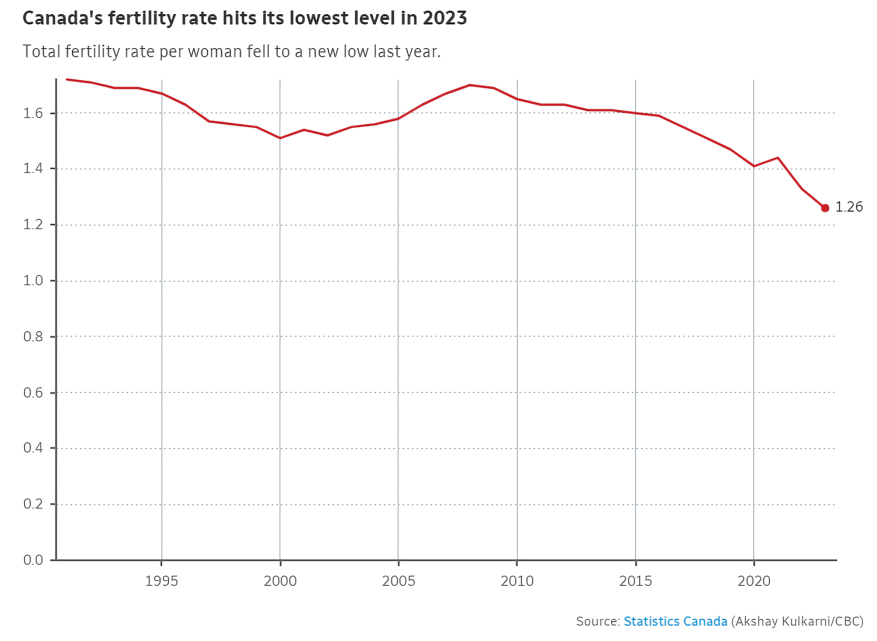Canada's Fertility Crisis: Economic Pressures Drive Low Birth Rates
Canada has reached a historic low in fertility rates for the second consecutive year, according to Statistics Canada. The national fertility rate now stands at 1.26 children per woman, with British Columbia recording the lowest rate in the country at just one child per woman.
Despite the stable number of births, approximately 350,000, similar to 2022, the decline in fertility rates is attributed to an increase in the number of women of childbearing age. Statistics Canada noted that Canada has joined the ranks of countries classified as having "lowest-low" fertility rates, alongside nations such as South Korea, Spain, Italy, and Japan, all of which report rates of 1.3 children per woman or lower. For context, the fertility rate in the United States was 1.62 per woman in 2023.

The data reveals that ten out of thirteen provinces and territories have recorded their lowest birth rates to date. Additionally, the rate of premature births has surged to 8.3%, marking the highest level in fifty years. This increase is likely linked to a growing number of older mothers, as the risk of premature birth escalates with maternal age. In 2023, 26.5% of new mothers were aged 35 or older, a significant rise from 10.7% in 1993. The average age for childbirth has also risen to 31.7 years.
Economic Factors Influencing Fertility Decisions
Experts attribute these trends largely to economic factors. Dr. Renée Hall, a clinical associate professor at the University of British Columbia and co-medical director at Willow Reproductive Centre, emphasized that young people are increasingly hesitant to start families due to financial instability exacerbated by high living costs and housing crises. "The economic impact from recent years, stemming from COVID-19 and inflation, has led many young individuals to delay parenthood or reconsider their ability to have children altogether," she stated.
Dr. Beth Taylor, another clinical associate professor at UBC and co-founder of Olive Fertility Centre, noted a growing trend of women postponing childbirth until their late 30s and 40s. She observed an uptick in women seeking to freeze their eggs, reflecting a desire for future parenthood despite current uncertainties.
Both doctors caution that while advanced fertility techniques exist, there are limits based on age. "It's crucial to use contraception wisely and follow guidelines to avoid unintended pregnancies when circumstances aren't favorable," Taylor advised. "However, it's equally important not to wait too long, as there is a finite window for having children."
As Canada grapples with these demographic shifts, the implications for social policy and economic planning are profound, raising questions about future family structures and workforce sustainability in an evolving societal landscape.
-
19:31
-
19:00
-
18:30
-
18:00
-
17:30
-
17:00
-
16:30
-
16:00
-
15:30
-
15:00
-
14:30
-
14:05
-
14:00
-
13:50
-
13:40
-
13:30
-
13:20
-
13:00
-
12:45
-
12:20
-
11:50
-
11:30
-
11:20
-
11:15
-
11:00
-
10:50
-
10:45
-
10:30
-
10:20
-
10:15
-
10:00
-
09:50
-
09:45
-
09:30
-
09:20
-
09:15
-
09:00
-
08:45
-
08:30
-
08:20
-
08:15
-
08:00
-
07:50


